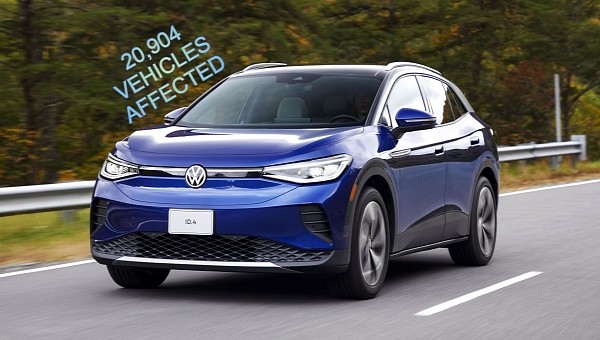Twinned with the ID.3 hatchback, the Volkswagen ID.4 crossover is extremely popular in the United States. Riddled with issues from day one, the all-electric sport utility vehicle has been recently called back over the software programming of the high-voltage battery management control unit and pulse inverter control unit.
Volkswagen became aware of the software-related issue in July 2021. Due to a rising number of field reports from the European market concerning a potential software issue, the German manufacturer started an investigation.
Following the initial assessment of potential consequences, Volkswagen also conducted a risk assessment, which indicated no unreasonable risks for the occupants and other traffic participants. From September 2021 through August 2022, the number of reports grew, although no crash or injury allegations were related to this problem.
Valeo Powertrain Electrified Mobility, the supplier of the suspect software, informed Volkswagen of an issue with the pulse inverter control unit software in January 2022. The supplier could not rule out the potential deactivation of the pulse inverter caused by a programming error.
Once again, the Wolfsburg-based automaker started an investigation. In the period between August 2022 and September 2022, the German manufacturer analyzed a number of vehicle owner questionnaires as well, VOQs alleging potential stalling events. The questionnaires forced Volkswagen Group of America to initiate further investigations to clarify the problem with the NHTSA.
Volkswagen could not determine any unreasonable risk to motor vehicle safety. The issue at hand does not affect steering and braking functions, with the Volkswagen ID.4 remaining controllable in case of losing drive power.
The all-electric sport utility vehicle will operate as usual after a restart. Be that as it may, Volkswagen couldn’t pretend that this issue didn't warrant a recall any longer. The concern was presented to the Product Safety Committee, which decided in favor of a recall after receiving an update on field cases from the U.S. market.
According to documents presented to the National Highway Traffic Safety Administration, the high-voltage battery management control module may reset. In rare cases, the pulse inverter may deactivate while driving.
Both scenarios lead to a loss of propulsion without any warning to the driver, scenarios that increase the risk of a crash. As it happens, the self-diagnosis software of the battery management system is too sensitive in certain situations, a sensitivity that leads to the reset condition.
20,904 vehicles are believed to feature suspect programming, 2021 model year vehicles produced in the period between May 26th, 2020, and January 20th, 2022. Dealers will be instructed no later than March 31st, 2023, to update both control units with revised software.
The improved software was introduced into production in December 2021 and May 2022, respectively. According to the document attached below, affected owners will be informed by first-class mail of this recall on March 31st, 2023.
Following the initial assessment of potential consequences, Volkswagen also conducted a risk assessment, which indicated no unreasonable risks for the occupants and other traffic participants. From September 2021 through August 2022, the number of reports grew, although no crash or injury allegations were related to this problem.
Valeo Powertrain Electrified Mobility, the supplier of the suspect software, informed Volkswagen of an issue with the pulse inverter control unit software in January 2022. The supplier could not rule out the potential deactivation of the pulse inverter caused by a programming error.
Once again, the Wolfsburg-based automaker started an investigation. In the period between August 2022 and September 2022, the German manufacturer analyzed a number of vehicle owner questionnaires as well, VOQs alleging potential stalling events. The questionnaires forced Volkswagen Group of America to initiate further investigations to clarify the problem with the NHTSA.
Volkswagen could not determine any unreasonable risk to motor vehicle safety. The issue at hand does not affect steering and braking functions, with the Volkswagen ID.4 remaining controllable in case of losing drive power.
The all-electric sport utility vehicle will operate as usual after a restart. Be that as it may, Volkswagen couldn’t pretend that this issue didn't warrant a recall any longer. The concern was presented to the Product Safety Committee, which decided in favor of a recall after receiving an update on field cases from the U.S. market.
According to documents presented to the National Highway Traffic Safety Administration, the high-voltage battery management control module may reset. In rare cases, the pulse inverter may deactivate while driving.
Both scenarios lead to a loss of propulsion without any warning to the driver, scenarios that increase the risk of a crash. As it happens, the self-diagnosis software of the battery management system is too sensitive in certain situations, a sensitivity that leads to the reset condition.
20,904 vehicles are believed to feature suspect programming, 2021 model year vehicles produced in the period between May 26th, 2020, and January 20th, 2022. Dealers will be instructed no later than March 31st, 2023, to update both control units with revised software.
The improved software was introduced into production in December 2021 and May 2022, respectively. According to the document attached below, affected owners will be informed by first-class mail of this recall on March 31st, 2023.







